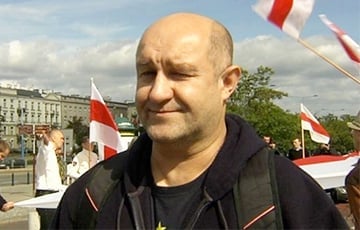Belarus in NATO: Myth or Reality?
16- ANDRIUS KUBILIUS
- 1.05.2024, 13:50
- 12,864

PHOTO: 15MIN.LT
The future relationship between Belarus and NATO is an important factor.
The Charter97.org website continues to publish articles from the book Belarus in NATO, published by the European Belarus Foundation. This article was written by former Lithuanian Prime Minister and Member of the European Parliament Andrius Kubilius.
The question of future relations between Belarus and NATO may elicit an ironic smile from someone today, as it may seem disconnected from reality. However, in the midst of geopolitical tremors shaking the entire European continent, any inquiry into Belarus's future is neither naive nor untimely.
Of course, discussing the future relations between Belarus and NATO implies that we are talking about the future relations between democratic Belarus and NATO, as discussing Belarus's relations with NATO as long as Belarus is effectively controlled by the authoritarian ruler Lukashenka makes little or no sense.
For several years potential future leaders of democratic Belarus have been formulating pro-European geopolitical orientation, goals, and aspirations of Belarus after the fall of the Lukashenka regime. This is crucial because it allows Belarusian people, who are still living under oppressive conditions, to understand the direction in which the democratic forces will guide Belarus when its people regain the right and freedom to determine their country's destiny after the regime falls.
The choice awaiting Belarusians, after they reclaim democratic freedoms, will be straightforward: whether they want to live a normal and secure European life or reject such a prospect, opting to remain hostages to the political culture and lifestyle of the post-imperial Eastern sphere.
As the experience of Eastern European countries over the past few decades demonstrates, once these countries regained democratic rights, they sought to distance themselves from authoritarian Putin's Russia and aimed to integrate into Euro-Atlantic Western structures as quickly as possible. This was the case with Georgia, Ukraine, Moldova, and now Armenia is beginning to follow this path. There are no rational arguments to suggest that democratic Belarus will not follow the same path. Therefore, it can be confidently stated that democratic Belarus will also move in the direction of Western integration because it is the only way to ensure security and prosperity for its people on the European continent.
Quite recently Belarusian democratic forces confirmed that democratic Belarus will aim to become a member of the European Union. Certainly, the final geopolitical choice will be made by the people of democratic Belarus when they regain the right and freedom to make such decisions.
Belarusian democratic forces and European Union institutions can already begin preparations for future integration and start drafting and announcing the project of a future Association Agreement because such an agreement will be the first step on the path to integration.
It also demands to define the future relationship between democratic Belarus and NATO. In this case, it is worth considering the definitions and arguments regarding such relations, differentiating them through the lens of two significantly different scenarios of geopolitical changes in the region:
a) Russia, together with Belarus, embarks on a path of democratic transformation, or
b) Russia continues to be governed by an authoritarian regime.
Why is it worth distinguishing these two different scenarios?
First and foremost, we need to discuss how the transformation towards democracy in Belarus itself could unfold. In theory, there are several possible scenarios, with the distinguishing feature being whether such changes occur simultaneously in Belarus and Russia or whether they occur at different times.
Firstly, it is worth noting that the main trigger for such changes could be Ukraine's clear victory over Russia, which would force Russia to withdraw its military from all occupied Ukrainian territories. In this case, we could expect that the defeated Russia would witness the downfall of the Kremlin regime, while at the same time a transformation toward democracy would commence within Russia. Simultaneously, the regime of Lukashenka, who is a Kremlin protégé, would also collapse in Belarus.
Another possible scenario is that Ukraine's victory leads only to the fall of the Lukashenka regime, prompted by the Belarusian Kalinouski Regiment, which would return to Belarus after the victory in Ukraine.
Separately from developments in Russia, significant changes can also occur in Belarus in the event of Lukashenka, who has long had visible health problems, finally passing away or is becoming incapable to govern. This opens the door to significant changes driven by the current political and business elite in Belarus, which has freed itself from Lukashenka’s dictatorship. This would mark the beginning of a ‘Belarusian perestroika,’ which, like the Soviet Union’s perestroika during Gorbachev’s time, eventually breaks free from the control of such a ‘perestroika elite’ and evolves into a true democracy.
Separately from Russia's transformation, Belarus could also see scenarios similar to those in Ukraine or Armenia, where regimes close to the Kremlin, such as Yanukovych or Sargsyan regimes, were ousted by the massive rallies for democracy.
Lukashenka brutally suppressed the first such attempt in 2020, but this does not negate the historical trend in the post-Soviet space, where democracy gradually but steadily spreads from the western borders to the eastern regions. In the case of such historical inevitability, democratic changes would primarily occur in Belarus and only then extend to the current Russian territories, where Belarus' example could serve as significant inspiration for the Russian people.
In any case, the future democratic Belarus' relations with NATO are worth considering in the context of those two possible scenarios for Russia's development: a) Belarus goes through democratic changes while Russia continues to be governed by an authoritarian regime, and b) Russia, along with Belarus, embarks on the path of democratic transformation.
I. Authoritarian Russia and Democratic Belarus
It is abundantly clear that authoritarian Russia will oppose democratic changes in Belarus and, once they occur, will attempt to undermine democratic Belarus by all means, including military ones, to threaten its security. For the authoritarian Kremlin regime, democratic Belarus poses a threat not because it would lean towards the European Union or NATO, which would endanger Russia's security, but because Belarus' Western integration would create a danger to the survival of the authoritarian Kremlin regime. The Kremlin knows very well that Belarus's integration with the West is the only possibility of how conditions for a normal European type of life can be successfully created in Belarus. Just as such conditions have been established in Central Europe and the Baltic States over the past decades, and as they are being developed in Ukraine, Moldova, Armenia or Georgia today. The evolution of the success of Belarus through integration with the European Union is dangerous to the Kremlin regime (not Russia itself), just as Ukraine's integration into the European Union is a threat to the Kremlin regime too.
The success of both Belarus and Ukraine's democracies, becoming inspiring and followable examples for the Russian people would undermine the foundations of the authoritarian Kremlin regime.
There is no doubt that the Russian people, while witnessing the success of Ukraine and Belarus, would increasingly question why Russia could not undergo such democratic changes, which would mean the end of Putin's regime.
Certainly, Putin's regime began military aggression against Ukraine, fearing the prospects of its democratic success. It was also frightened by the 2020 people's revolution in Belarus, which showed that the alleged loyalty of Belarusians to the Lukashenka regime, which Lukashenka had enjoyed until then, was a complete fiction, evaporating during the first mass demonstrations. Putin understood that the loyalty of ordinary Russians to his authoritarian Kremlin regime is also the same fiction, which could also quickly dissipate. Starting a war against Ukraine, Putin sought not only to stop the success trajectory of Ukraine, which was mortal to his regime, but also to send a frightening signal to the Belarusian society – look at what awaits you if, like Ukrainians, you strive for democracy and European integration. Putin's aim was twofold: firstly, to thwart any temptation for ordinary Russians to follow their neighbours' example of democratic success, primarily hoping to destroy the opportunities for such success militarily and, secondly, to flood his citizens' minds with total propaganda and war hysteria.
Therefore, the prospects of democratic Belarus are crucially dependent on Ukraine's military victory in the near future. Because it would serve as a response to both Belarusian and Russian citizens that Putin is incapable of stopping the success of democratic Ukraine. Consequently, he would be incapable of halting the success of democratic Belarus when it follows the same path.
Russia's war against Ukraine is a painful lesson for the democratic West, whose long-standing mistaken geopolitical stance contributed to Putin ultimately deciding that he could initiate military aggression against Ukraine, and the West would not respond adequately. As the West failed to respond adequately to the war in Georgia or the occupation of Crimea. The West's major mistake was leaving Ukraine in a "grey" security zone, without real prospects of integrating into the EU or NATO, even after Ukraine definitively turned towards democracy and European integration in 2014. The West kept its attitude that Ukraine's integration should not "provoke Putin," but it was precisely this stance that provoked Putin's aggression because the West did not open the doors to integration and left Ukraine precisely in the same "grey" zone.
It seems that the West has already recognised its mistake, which is why Ukraine and Moldova have become candidates for EU membership, and negotiations on their membership are likely to begin soon. Both countries are ambitiously expected to become EU members by 2030. It is also likely that NATO will extend an invitation to Ukraine in the near future. This way, Ukraine will finally be removed from the dangerous "grey" zone.
This lesson must be incorporated into a clear concept for a new Western security on the European continent: democracies that emerge and establish themselves in Eastern EU neighbouring countries must not be left in a "grey" geopolitical security zone because doing so only creates temptation and provokes authoritarian Kremlin aggression against its neighbours who are transforming into democracies.
Therefore, once Belarus transforms into a democracy, and Russia remains under the occupation of its authoritarian kleptocratic regime, not only should democratic Belarus seek protection for its democracy by integrating into Euro-Atlantic organisations, including NATO and EU, but the West itself should also be interested in the integration of democratic Belarus and offer security guarantees to democratic Belarus.
II. Democratic Russia and Democratic Belarus
Russia's transformation from an authoritarian state into a democratic republic would be a fundamental change to the security architecture of the entire European continent. Democracies do not wage war against each other. This would mean the end of Russia's aggressive stance towards all its democratic neighbours. The success of democratic neighbours would no longer threaten the authority of democratic Russia but, on the contrary, would encourage healthy competition to achieve the same level of success in Russia.
Such a new geopolitical situation would also raise broader questions, such as the future goals of NATO. NATO was founded in 1949 to protect the West from the aggressive expansion of authoritarian Stalinist Russia (the Soviet Empire) into Western Europe. With the absence of authoritarian Russia, there would be no more threats of its aggression. It might seem that in such a case, not only would democratic Belarus no longer need to consider NATO membership, but the organisation itself would need to rethink the basis for its continued existence – if there is no longer an authoritarian threat, what then should NATO defend Europe against?
However, there is a serious strategic argument why, even after Russia transforms into a democracy, not only should NATO remain, but it should also enlarge to democratic Belarus, not to mention Ukraine. Moreover, this would be necessary for the democratic Russia itself.
Democratic Russia would very soon, after such a transformation occurs, face a phenomenon typical of all collapsing empires – societal nostalgia for the past and the former grandeur of the empire. For former empires, this has caused significant challenges to their democracies. During Yeltsin's era, democracy in Russia could not withstand such waves of nostalgia, and Putin, after he came to power, actively fueled this nostalgia. It is evident that democratic Russia, if it re-emerges, will face a similar challenge. This time, the West can significantly assist Russian democracy in resisting the "post-imperial nostalgia" threat. For this, the West must demonstrate through its actions that Russia no longer has any chances to restore its empire, as both Ukraine and democratic Belarus are firmly integrated into the Western security (NATO) and economic organisations (EU). As Zbigniew Brzezinski said, "Russia, which has the possibility to control Ukraine (and Belarus), will always remain an empire, while Russia that loses these opportunities will have the possibility to become a democracy." NATO membership for Belarus and Ukraine would send a clear signal that Russia will never have the opportunity to control these countries again. This would be very healthy for the fledgling Russian democracy.
Therefore, in any case, democratic Belarus will need to strive for NATO membership, not only for the security of democratic Belarus against the authoritarian Kremlin but also for the sake of a democratic Europe and sustainable peace on the European continent.
It would also be necessary for democratic Russia's sake, to strengthen its resistance against the wave of "post-imperial nostalgia".
In conclusion, the future relations between Belarus and NATO are not merely a fantasy but a possible and important consideration in the context of Belarus's democratic transformation and its impact on the geopolitical landscape of Eastern Europe. Regardless of the path Belarus takes to democracy, whether simultaneous with Russia or independent of it, NATO membership offer for democratic Belarus will be crucial for its security, fostering a more stable and peaceful Europe and assisting Russia in overcoming nostalgia to its imperial past.
Andrius Kubilius is a Lithuanian politician and a Member of the European Parliament (MEP). He served as Prime Minister of Lithuania from 1999 to 2000 and again from 2008 to 2012.
Between 1990 and 1992, he was the Secretary-in-Charge of the Lithuanian Pro-independence Reform Movement Sajūdis and Chairman of the Homeland Union – Lithuanian Christian Democrats from 2003 to 2015. He was a Member of the Seimas of the Republic of Lithuania between 1992 and 2019.
Andrius Kubilius is the Head of the EPP Group Lithuanian Delegation in European Parliament, Co-President of Euronest Parliamentary Assembly, Standing Rapporteur of European Parliament On Russia and the Initiator and Chair of various Inter-parliamentary Forums in the European Parliament such as United for Ukraine (U4U) global network, the EU Neighbourhood East Forum, and Friends of the European Russia Forum.











